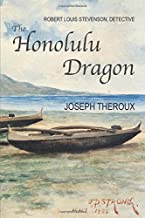Review — HONOLULU DRAGON by Joseph Theroux (Samoa)
 Honolulu Dragon
Honolulu Dragon
by Joseph Theroux (Samoa 1975–78)
Kilauea Publications
August 2019
329 pages
$12.00 (paperback), $2.99 (Kindle)
Reviewed by Richard Lipez (Ethiopia 1962-64)
•
I’ve always been grateful that the Peace Corps sent me to Ethiopia with its culture of great richness and charm. But after reading Joseph Theroux’s engaging novel set in the South Pacific, I’m almost envious of his having landed in Samoa in 1975. His obvious love of the easy-in-the-islands way of life is infectious — not that Theroux shies away from the political and social turbulence that’s part of the region’s checkered history. It’s just like Ethiopia in that regard, and also of course the United States of America.
Honolulu Dragon is the third in Theroux’s series featuring Robert Louis Stevenson and his actual step-son Lloyd Osbourne in which the two writers solve crimes. Other real-life characters show up in this tale of Honolulu opium smugglers in 1894, and Theroux brings them all to life winningly.
The novel is narrated by Lloyd, and his is a companionable voice that’s reminiscent of Conan Doyle and of Stevenson himself. He’s a curious, adventure-minded 26-year-old whose father vanished seven years earlier and was thought to be dead. The elder Osbourne had been a court reporter in San Francisco and may have crossed some opium-empire bad actors.
Suddenly, however, evidence turns up in Honolulu suggesting that “Papa” might be alive. And it’s no coincidence that good-hearted Robert and Lloyd have helped a ship-wrecked German sailor who is soon arrested for smuggling opium in the heels on six pairs of shoes. There’s a fascinating scene where Stevenson visits a Honolulu opium den. He’s there for investigatory reasons but seems to have an awfully nice time while he’s at it.
Theroux (who, yes, is Paul’s younger brother) is an accomplished historian of the novel’s time and place, and he sets his scenes with flavorful newspaper excerpts, vaudeville programs, and restaurant menus. There’s interesting dope, too, on islander pastimes such as — surprising to me — baseball. Competitions are fierce. Says Lloyd at a game he attended: “I was surprised at the aggression shown in the supposed gentlemen’s game. Basemen stomped on runners’ feet, base-runners barreled into basemen as they lunged, and several times, it seemed, both pitchers aimed — not for the catcher’s glove — but for the batter’s cranium.” Also, the native Hawaiians, eschewing missionary customs, prefer to play barefoot.
Some of the islanders occupy responsible positions in society. A cop named David Nahalewa rises through the ranks — or does until he lets some lepers ride in a wagon instead of making them walk. Then he’s suspended. Most of the locals, in fact, are kept down by the white American businessmen who run the former kingdom. A vote is soon to take place as Hawaii becomes a republic, but voting will be restricted to “the able and informed” — that is, property-owning white people.
Modernity does show up in other ways. Telephones are a novelty most people love, though Stevenson himself calls it an “infernal machine” that he prefers to avoid. The most strikingly modern character is Kate Durham, a self-described “new woman” who has her own court reporting service. When Lloyd becomes smitten with her, she hops in the sack with him without apparently giving it a second thought. Lloyd’s other inamorata is a Samoan princess named Sosifina. She is liberated in her own way, wielding a machete in combat back home and gifting her pop with a couple of unsmiling severed heads. Lloyd is crazy about both of these unique and appealing women and in the end has to choose.
The final confrontation with the ruthless Chinese opium gang is a little less convincing than the more routine detective work Robert and Lloyd perform. They’re held captive for a time, and their escape from the Dragon gang feels more Hardy Boys than Hitchcock or Spielberg.
Overall, though, Honolulu Dragon is a colorful and thoroughly entertaining addition to the Stevenson crime-solving series, and I hope more are in the works.
•
Richard Lipez (Ethiopia 1962–24, PC/DC 1964–67) is a former editorial writer at The Berkshire Eagle. He writes the Don Strachey private eye novels under the name Richard Stevenson and reviews mysteries for The Washington Post.
No comments yet.
Add your comment